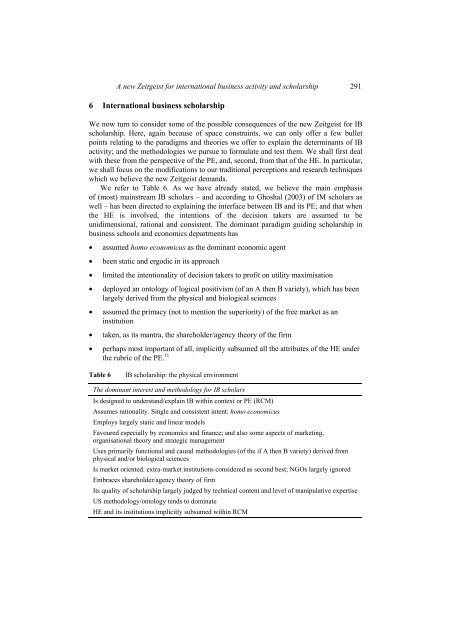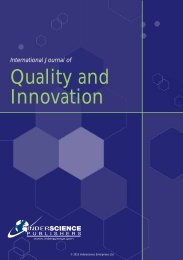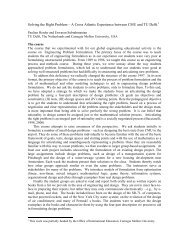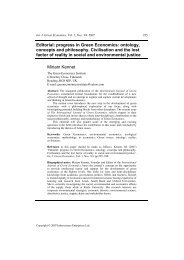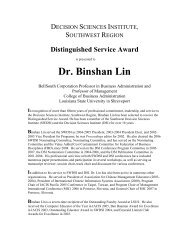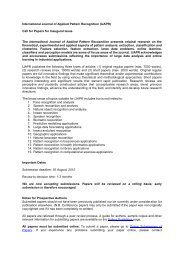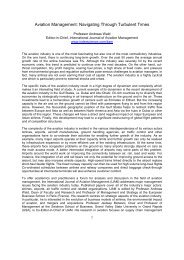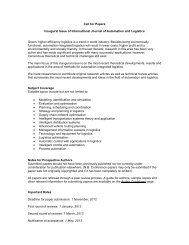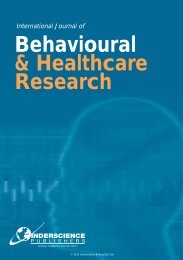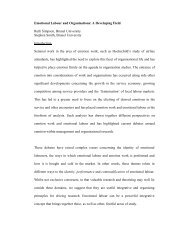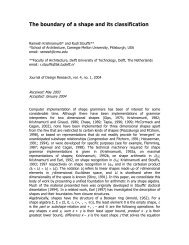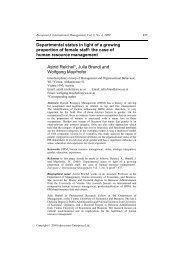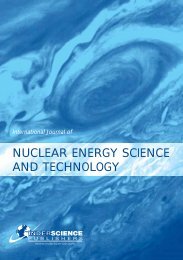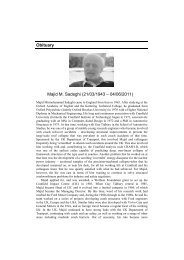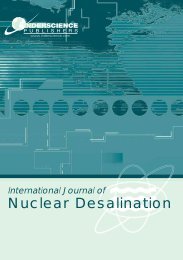A new Zeitgeist for international business activity and ... - InderScience
A new Zeitgeist for international business activity and ... - InderScience
A new Zeitgeist for international business activity and ... - InderScience
You also want an ePaper? Increase the reach of your titles
YUMPU automatically turns print PDFs into web optimized ePapers that Google loves.
A <strong>new</strong> <strong>Zeitgeist</strong> <strong>for</strong> <strong>international</strong> <strong>business</strong> <strong>activity</strong> <strong>and</strong> scholarship 291<br />
6 International <strong>business</strong> scholarship<br />
We now turn to consider some of the possible consequences of the <strong>new</strong> <strong>Zeitgeist</strong> <strong>for</strong> IB<br />
scholarship. Here, again because of space constraints, we can only offer a few bullet<br />
points relating to the paradigms <strong>and</strong> theories we offer to explain the determinants of IB<br />
<strong>activity</strong>; <strong>and</strong> the methodologies we pursue to <strong>for</strong>mulate <strong>and</strong> test them. We shall first deal<br />
with these from the perspective of the PE, <strong>and</strong>, second, from that of the HE. In particular,<br />
we shall focus on the modifications to our traditional perceptions <strong>and</strong> research techniques<br />
which we believe the <strong>new</strong> <strong>Zeitgeist</strong> dem<strong>and</strong>s.<br />
We refer to Table 6. As we have already stated, we believe the main emphasis<br />
of (most) mainstream IB scholars – <strong>and</strong> according to Ghoshal (2003) of IM scholars as<br />
well – has been directed to explaining the interface between IB <strong>and</strong> its PE; <strong>and</strong> that when<br />
the HE is involved, the intentions of the decision takers are assumed to be<br />
unidimensional, rational <strong>and</strong> consistent. The dominant paradigm guiding scholarship in<br />
<strong>business</strong> schools <strong>and</strong> economics departments has<br />
• assumed homo economicus as the dominant economic agent<br />
• been static <strong>and</strong> ergodic in its approach<br />
• limited the intentionality of decision takers to profit on utility maximisation<br />
• deployed an ontology of logical positivism (of an A then B variety), which has been<br />
largely derived from the physical <strong>and</strong> biological sciences<br />
• assumed the primacy (not to mention the superiority) of the free market as an<br />
institution<br />
• taken, as its mantra, the shareholder/agency theory of the firm<br />
• perhaps most important of all, implicitly subsumed all the attributes of the HE under<br />
the rubric of the PE. 11<br />
Table 6<br />
IB scholarship: the physical environment<br />
The dominant interest <strong>and</strong> methodology <strong>for</strong> IB scholars<br />
Is designed to underst<strong>and</strong>/explain IB within context or PE (RCM)<br />
Assumes rationality. Single <strong>and</strong> consistent intent: homo economicus<br />
Employs largely static <strong>and</strong> linear models<br />
Favoured especially by economics <strong>and</strong> finance; <strong>and</strong> also some aspects of marketing,<br />
organisational theory <strong>and</strong> strategic management<br />
Uses primarily functional <strong>and</strong> causal methodologies (of the if A then B variety) derived from<br />
physical <strong>and</strong>/or biological sciences<br />
Is market oriented: extra-market institutions considered as second best; NGOs largely ignored<br />
Embraces shareholder/agency theory of firm<br />
Its quality of scholarship largely judged by technical content <strong>and</strong> level of manipulative expertise<br />
US methodology/ontology tends to dominate<br />
HE <strong>and</strong> its institutions implicitly subsumed within RCM


